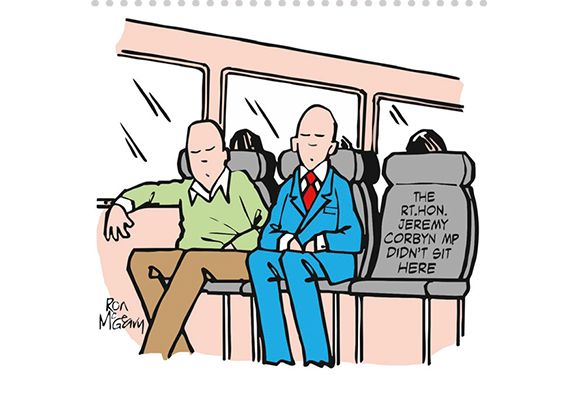The one achievement that even Jeremy Corbyn’s enemies struggle to dismiss is his success in building the membership of the Labour Party. They may not like the results, but it is hard to deny that he has revitalised the party as a mass movement: the total membership is now more than half a million, nearly three times what it was after the 2015 general election. Corbyn flags up this fact as his primary political accomplishment: he took a moribund organisation and has injected it with genuine popular enthusiasm. The party, he says, is stronger than it has ever been and swathes of people who had given up on political participation have found a new reason to join in. Enthusiasm and popular participation are invariably seen as good for democracy. So how can it be so bad?
The answer is that enthusiasm and participation are not always a good thing. Take voter turnout: it is not true that the higher the turnout at elections, the healthier the democracy. Turnout was exceptionally high during the Weimar period in Germany, topping 80 per cent in national elections. That did not make it a strong and stable democracy. People voted in such numbers because they cared desperately about the result; more to the point, they were terrified of what might happen if their opponents won. Enthusiasm was a proxy for fear and insecurity. The same can be said of recent elections in Iraq, where turnout has been as high as 95 per cent in some districts. People queue for hours in the boiling sun to vote because they will do whatever they can to keep their sectarian opponents from coming out on top. Mass participation can be a sign of how little confidence people have in the fairness of the system. They join in because they don’t trust others to take decisions for them.
This is a particular problem for political parties in relatively stable democracies. The basic job of political parties is to bridge the gap between the majority of people, who have little or no interest in politics, and the smaller numbers who care passionately and are willing to devote time and energy to getting the result they want. Parties are a sorting device for marrying mass indifference with minority enthusiasm: they exist to find the issues that can link up the voters who only switch on to politics at election time, if at all, with the far smaller numbers of people whose grunt work keeps the show on the road the rest of the time. When the party as a whole is taken over by the enthusiasts, that link is broken. This is what has happened to Labour. The party no longer acts as a mechanism for bridging the gap between the over-committed and the under-committed. Instead, it now symbolises that divide.
"Parties are a sorting device for marrying mass indifference with minority enthusiasm"Worse, the divide is growing. The central conflicts in British politics are not so much on questions of policy-austerity vs anti-austerity, centralism vs devolution, public vs private ownership—as on questions of engagement. It’s not what you believe but how much you believe in it. This gets to the issue of trust. People who passionately believe in their cause are also much less likely to be happy letting people with opposing beliefs take decisions for them. Enthusiasm breeds mistrust. Successful political parties persuade the voters to trust the professionals to take decisions for them. The current Labour membership appears to disdain that trust, which puts it not simply at odds with the parliamentary party but also with the voting public. Polling suggests that there is relatively wide public support for a range of Corbynite politics (nationalisation of the railways, caps on executive pay, greater public investment). But the public is not going to entrust Corbynites with enacting them. That’s because the Labour Party no longer represents the public. It represents itself.
Of course, it doesn’t follow that parties are more successful the fewer members they have, any more than a democracy works better as turnout approaches zero. A lack of enthusiasm can also be fatal. Nor is it simply a question of numbers. The Tory Party had a membership of three million in the 1950s, but it worked far better than Labour does at present. Membership on that scale blunts the bias in favour of the overcommitted because many people are only there for social rather than political reasons. Charles Moore’s loving recreation of the world of local Tory associations in his biography of Margaret Thatcher shows that dancing and dressing up mattered more than policies, which made the party a better representation of the wider public. It also gave fearlessly ambitious politicians like Thatcher a path to the top, because she was able to stand out. The current Tory membership of around 150,000 is much more biased in favour of people who care passionately about their pet issues—notably about leaving the European Union—but the fact that the members have mostly been around a long time makes their enthusiasms easier to manage. There has been no great influx into the Tory ranks of people with a sudden interest in politics and the impatience that goes with that. Which is why Theresa May is Prime Minister and Jeremy Corbyn never will be.
A sudden upsurge of popular enthusiasm is not impossible for modern parties to manage. The SNP has shown how it can be done. But it takes professionalism and discipline. While Labour has been tearing itself apart in Westminster, the SNP has become the most tightly managed party machine in British politics. It has also shown a willingness to compromise. It may not achieve its ultimate goal of Scottish independence but it will not destroy itself trying. Meanwhile, the Labour Party stands on the brink of death by enthusiasm.













